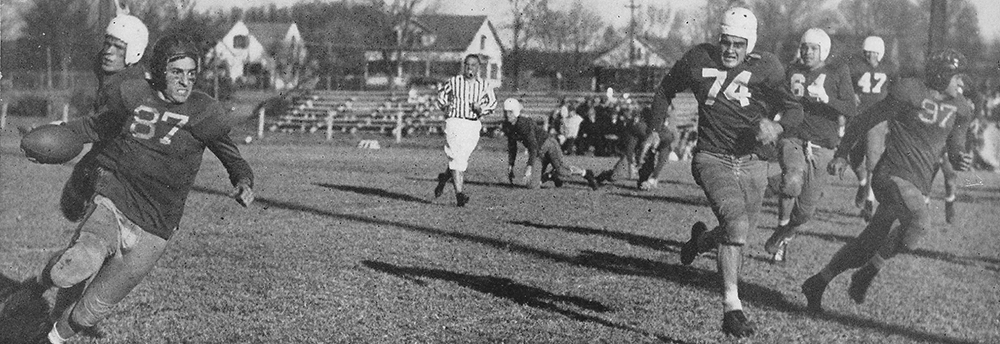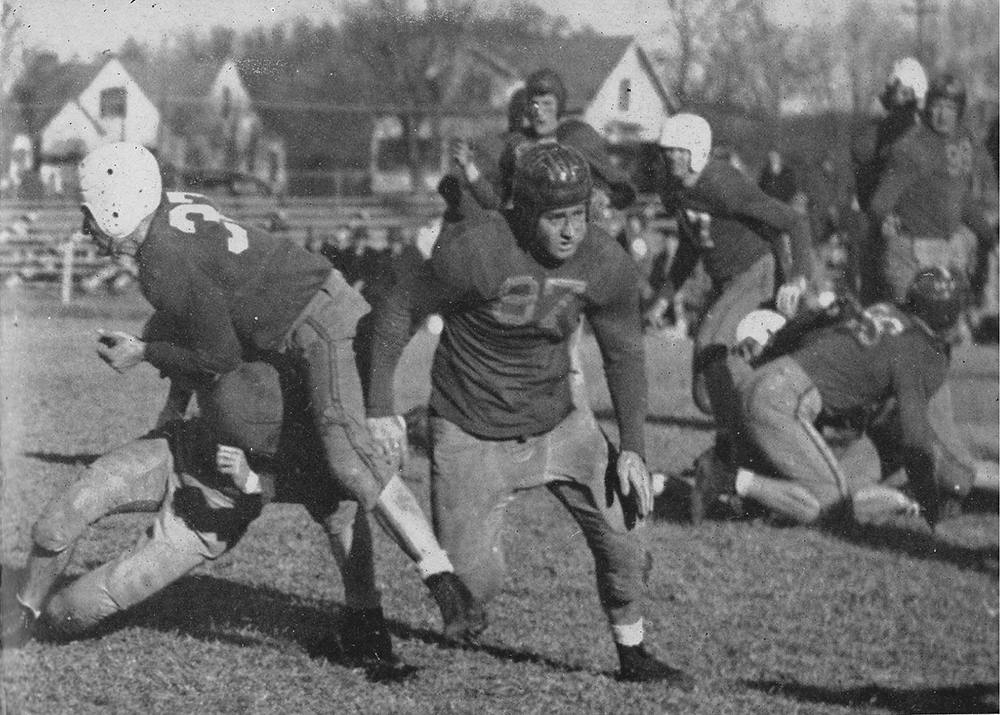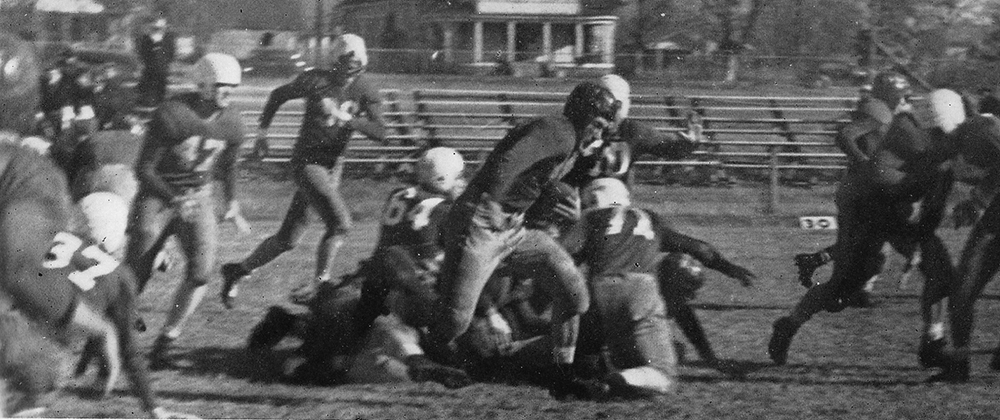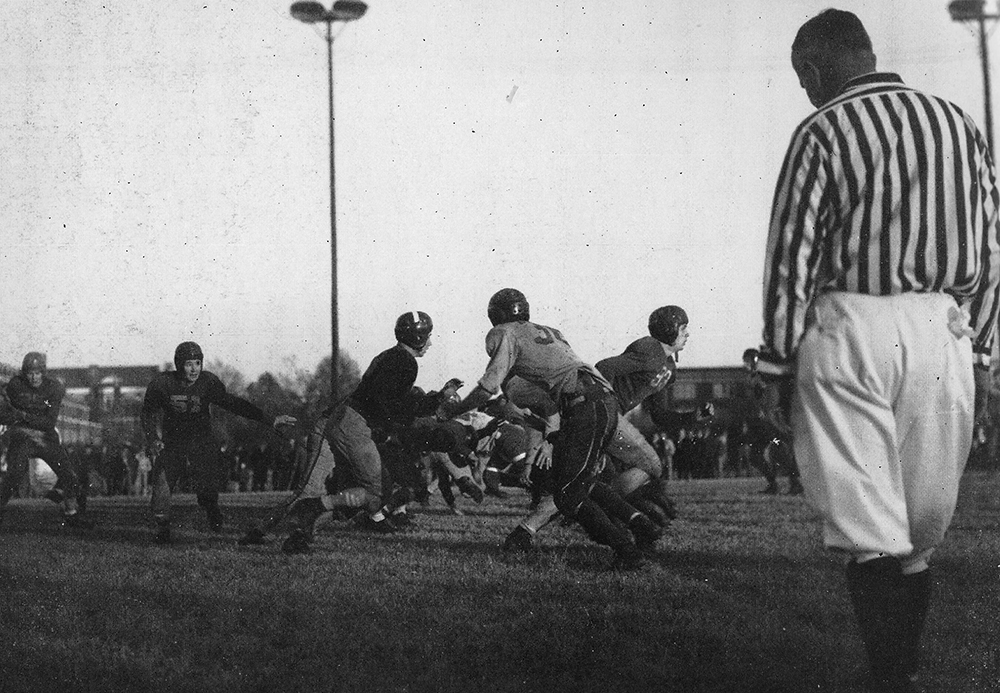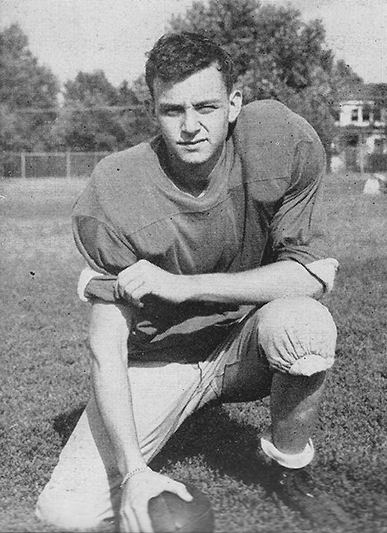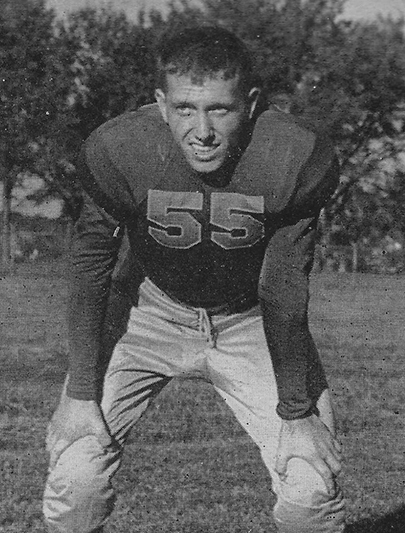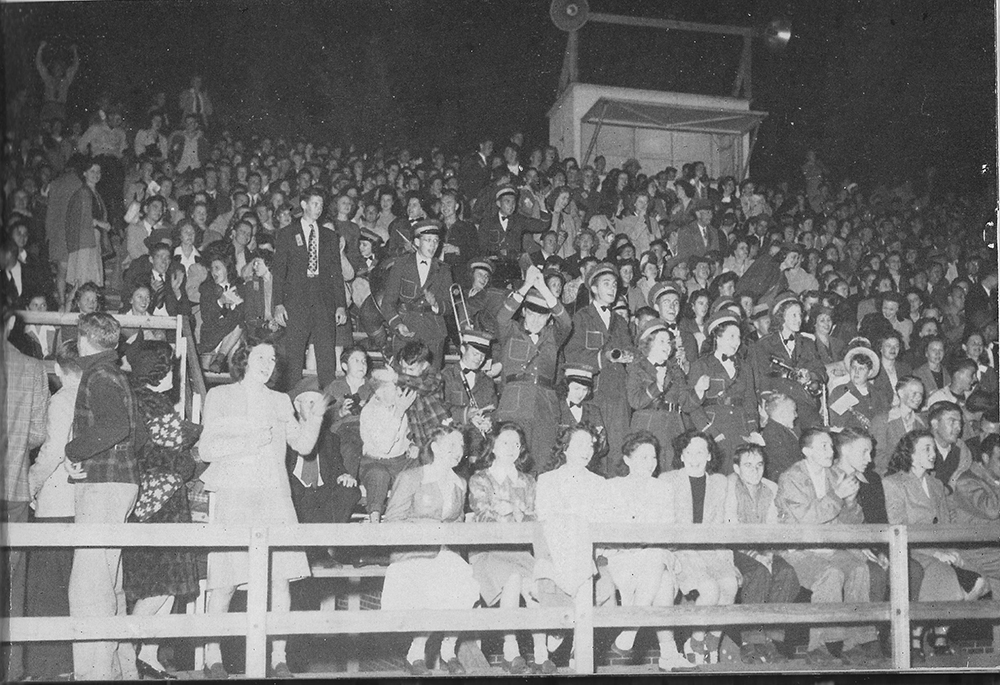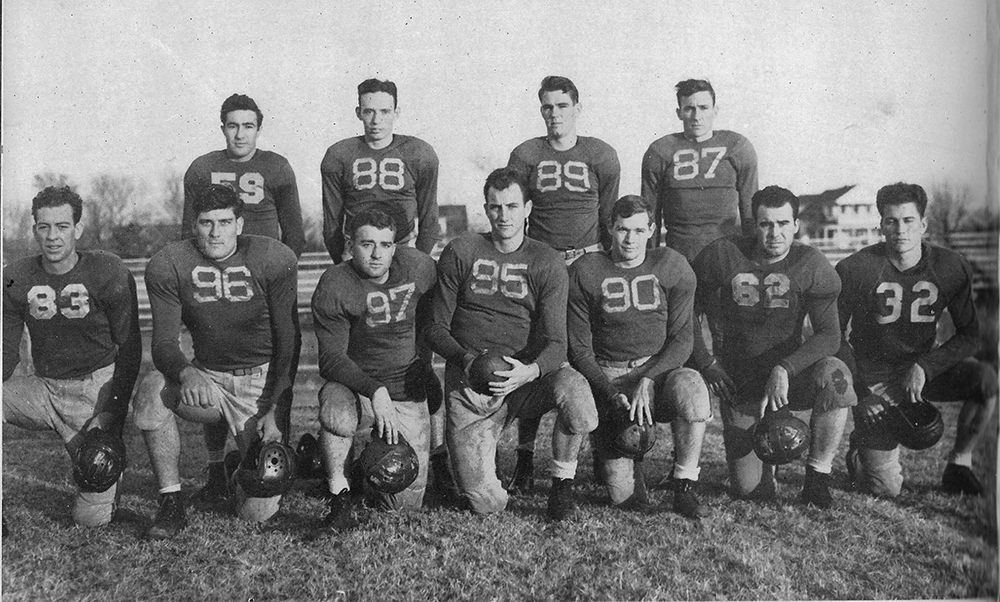
When it comes to the thorough and complete subdual of one’s opposition over the course of an entire season, few teams in the history of college football can match the record established by the 1945 Arkansas Tech Wonder Boys.
It was 75 years ago this autumn that a group of 48 young men — some of whom had recently completed service in World War II and some of whom would soon be involved in the Korean War — assembled on the Arkansas Tech campus for the beginning of football practice.
Under the leadership of the “Original Wonder Boy,” head coach John Tucker, they prepared for the first Arkansas Tech football season in four years.
There was little question as to the identity of their on-field leader.
Robert Aubrey “Cobb” Fowler was born to parents William Edward “W. E.” Fowler and Mrs. Mallie Sue Wigley Fowler of Dumas the same year that Tucker and his Arkansas Tech teammates first earned the Wonder Boys nickname (1920).
Fowler starred in football and track at Tech before World War II, and he was among the 104 Arkansas Tech male students called into the service of their country when the 206th Coast Artillery of the Arkansas National Guard was mobilized in January 1941. He later transitioned to the U.S. Army Air Corps and flew 33 missions over Germany, France, Holland, Belgium and Poland as a bombardier on a B-17 bomber.
Following World War II, Fowler returned to the Wonder Boys football team and set about the task of re-establishing Tech as the top program in the Arkansas Intercollegiate Conference. The Wonder Boys had won AIC titles in 1931, 1935 and 1939.
Arkansas Tech did more than win the AIC championship in 1945. Over a span of 57 days, the Wonder Boys defeated eight opponents by a cumulative score of 311-6. There was only one occasion upon which they were even moderately challenged. The only points they allowed were in the closing moments of a blowout win.
Vagaries of different eras make it impossible to identify the “best” team in Arkansas Tech football history. There is no question, however, as to which group of Wonder Boys set the widest gulf between themselves and their competition.
The Season
It began on the evening of Oct. 4, 1945, with approximately 1,000 fans in attendance at Buerkle Field to view the first college football game played in Russellville since before the war.
Bacone College offered little resistance to the Wonder Boys, who piled up 496 yards of total offense in an 80-0 non-conference victory.
Another out-of-league opponent, the school now known as the University of Louisiana-Monroe, arrived at Buerkle Field the following week and played Arkansas Tech to a scoreless stalemate through two quarters. The Wonder Boys preserved the tie with a goal line stand just before halftime.
After Fowler was injured in the third quarter, Jesse Lee Grace of Danville stepped into the void and led Tech to victory. He threw a touchdown pass to Earl Crosswhite of Harrison and returned an interception 60 yards for a touchdown to help the Wonder Boys escape with a 14-0 victory.
Tucker described the offense’s performance as “not so hot,” but went on to say that he was “well satisfied with the result. We were lucky to beat them.”
It was the last time the 1945 Wonder Boys would require any luck.
—–
Tech opened AIC play on Oct. 18 with a 22-0 home victory over Henderson State. The Wonder Boys limited the Reddies to 26 yards of total offense and three first downs.
Next up was the first road game of the season, an Oct. 25 contest against the Ouachita Baptist Tigers in Arkadelphia. Fowler proved he was not suffering any ill effects from the injury he had suffered two weeks prior by racing 84 yards for a touchdown in the opening quarter. He later passed for a touchdown as the Wonder Boys out-gained the Tigers by a margin of 451-80 in total offense yardage and cruised to a 31-0 victory.
Tucker chose to rest many of his front-line players late in the win over Ouachita in preparation for a contest one week later against Arkansas Tech’s arch rival — Arkansas State Teachers College (now known as the University of Central Arkansas).
Like the Reddies and Tigers before them, the Bears never had a chance.
Tech intercepted as many Teachers’ passes (4) as the Bears completed to their own receivers. The Wonder Boys scored two touchdowns in each of the first three quarters and then crossed the goal line four more times in the final period for good measure. Tech out-gained the Bears 527-124 in total offense and posted a 65-0 victory at Buerkle Field on Nov. 1.
—–
It was then that the Russellville community truly started to take note that something special was happening. On the Monday following the runaway win over Teachers, Sadie and Jack Doherty treated 39 Tech players and the cheer team to a celebratory turkey dinner with all the fixings at the Eureka.
Not even the tryptophan in the turkey could curtail the Wonder Boys’ juggernaut.
Following a bye week, Arkansas Tech traveled to Arkadelphia on Nov. 16 and handled Henderson State 25-6 at Haygood Field.
Carl Sorrels of Atkins and Jack Willis of Bald Knob scored two touchdowns apiece as the Wonder Boys amassed 462 yards of total offense. Tech’s defense limited the Reddies to 210 yards of total offense, 83 of which came on a fourth-quarter drive that resulted in a touchdown. They were the only six points allowed all season by the Wonder Boys.
Congressional Medal of Honor recipient Nathan Gordon, a member of Arkansas Tech’s 1935 AIC championship team, was the featured speaker six days later when the Tech campus celebrated Dad’s Day.
“Money is no true measure of success,” Gordon told those assembled for the Dad’s Day program. “To find out whether a man is truly successful, ask two questions: ‘what have you done to help others?’ and ‘are you happy?’”
The extent to which Fowler helped his teammates and brought happiness to the Arkansas Tech campus during the final two games of his Tech career proved that he was, without question, one of the most successful Wonder Boys of all time.
—–
Ouachita had no answer for Fowler on that Dad’s Day at Arkansas Tech. He scored all four of the Wonder Boys’ touchdowns on runs of 17, 1, 44 and 35 yards in his final appearance at Buerkle Field. Tech won 26-0 and improved to 7-0 on the season. The only date remaining on the schedule was an appointment in Conway to take on ASTC.
The second meeting of 1945 between Tech and Teachers played out much like the first.
Fowler was responsible for four touchdowns — two rushing, one on a 29-yard touchdown pass to Thomas Vines of Russellville and one on a 40-yard interception return.
Just as they had in the first meeting at Russellville, the Wonder Boys intercepted four Bears’ passes during the return engagement at Estes Field.
Sorrels added a 10-yard touchdown run and Ewell Thompson of Clarksville scored on touchdown scampers of 15 and 10 yards in a 48-0 Arkansas Tech victory on Nov. 29.
It was the final game in a Wonder Boys’ uniform for Fowler, Thompson and Grace.
“They will be hard to replace,” observed Tucker late in the 1945 season when asked about the trio. “Their accomplishments athletically will become a vital part of the tradition of greatness in Tech history.”
Epilogue
The businessmen of Russellville organized a postseason banquet for the Wonder Boys at Russellville Country Club on Dec. 14, 1945. Tickets were $2 per person, with $1 of each ticket going to cover the cost of the meal for a Tech player.
Tucker was recognized for his leadership as head coach. Assistant coaches P.K. Merrill and Paul Fiser were honored for their contributions.
Letters were awarded to 28 Wonder Boys: Paul Watkins of Rogers, J.C. Bohannon of Mulberry, Earl Crosswhite of Harrison, Gail Westover of Rogers, Thomas Vines of Russellville, Blake Partain of Booneville, Roy White of Benton, Jack Mobley of Morrilton, Herman Crabtrey of Atkins, Alton Shockley of Lamar, J.C Dodd of Benton, Harold Wilson of North Little Rock, Steed White of Bauxite, Sam Stathakis of Little Rock, James Tunnison of Hamburg, Darrel Baker of Russellville, Howard Smith of Little Rock, Jesse Lee Grace of Danville, Howard Faulkner of Conway, Kenneth Grey of Paris, Phillip Wilcoxen of Paris, Bill Cloer of Springdale, Carroll Trimble of Springdale, Carl Sorrels of Atkins, Jack Willis of Bald Knob and Aubrey “Cobb” Fowler of Dumas.
Fowler scored a total of 102 points during the 1945 season. Depending upon which account of the day one reads, he led at least the southwest region of the country and perhaps all of college football in scoring that season.
His final game at Arkansas Tech, which was a two-year college at the time, was far from the end of his football career. The following season, Fowler continued his studies at the University of Arkansas and helped a first-year head coach named John Barnhill establish his program.
Fowler was a member of the Razorbacks’ 1946 Southwest Conference co-championship team that played Louisiana State University to a scoreless tie in the 1947 Cotton Bowl and the 1947 Arkansas team that won the 1948 Dixie Bowl. He averaged 13.9 yards per punt return in 45 attempts during his two seasons in Fayetteville.
He went on to be drafted by the Baltimore Colts and he intercepted three passes while playing for them during the 1948 season, but 5-foot-10 and 153 pounds wasn’t an ideal frame for a professional football player. Fowler entered the coaching profession for three years in the Pocahontas School District and went on to a two-decade career with the Arkansas Game and Fish Commission.
Fowler was inducted into the Arkansas Sports Hall of Fame in 1982.
A survey of their obituaries reveals that other members of the 1945 Arkansas Tech team left positive marks on the world in a variety of ways.
Watkins served two tours of duty in Korea and later settled in his native northwest Arkansas with his wife Pat, whom he met at Arkansas Tech.
Crosswhite had a long career in education that included service as director of the vocational school at Arkansas School for the Deaf.
Vines was a casing machine operator for Harter’s Cannery in Yuba City, Calif., for 30 years, raised a family with his wife, Shirley, and passed away at the age of 97 with 16 great-grandchildren.
Mobley returned home to Morrilton, where he worked for Marquette Cement and lived the rest of his life. He was a member of the Knights of Columbus and a Boy Scout leader.
Grace became a captain in the U.S. Army. He applied his dentistry skills and training for the benefit of American soldiers in Korea and Japan before returning home to offer those same talents to the people of Mena for 37 years.
Sorrels returned to his hometown and served as head football coach for the Atkins Red Devils from 1949-71. He was later surpassed as Atkins’ all-time leader in coaching wins by his son, Arkansas Tech alumnus Charlie Sorrels.
Faulkner earned his master’s degree in psychology and counseling from the University of Arkansas and invested 25 years of his career as a psychological examiner for Arkansas Rehabilitation Service. In retirement, he regularly returned to Arkansas Tech to serve students breakfast during final exams as part of an outreach by the ATU Alumni Association.
Regardless of where life took them afterward, the 1945 Wonder Boys established a golden age of Arkansas Tech football that would continue almost unabated for a quarter-century. The AIC championship they won was the beginning of five consecutive AIC titles for Arkansas Tech, which would go on to win a 13 conference football championships from 1945-71.
But it was the manner in which they did it that separates the 1945 Wonder Boys in the history of Arkansas Tech football, and it was the extent to which they left their opponents hopelessly defeated that inspired the Associated Press to sum up their achievements thusly:
“Tech’s domination of the football picture was the widest possible. Coach John Tucker took a handful of veterans, molded them with a sprinkling of high school talent and the upshot was an undefeated, untied season.”
Writer’s note: this article was made possible by the archives of The Courier, the Arkansas Gazette and the Agricola yearbook, which are maintained by Ross Pendergraft Library and Technology Center at ATU and the ATU Office of Alumni Relations.
